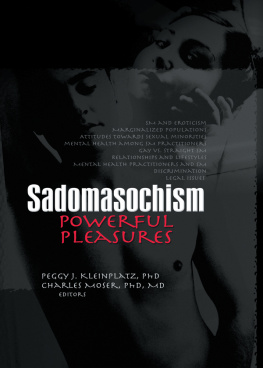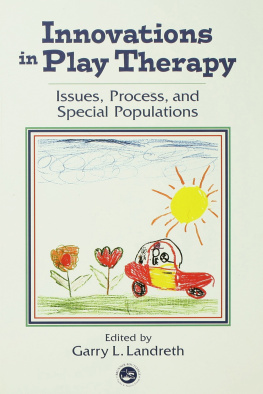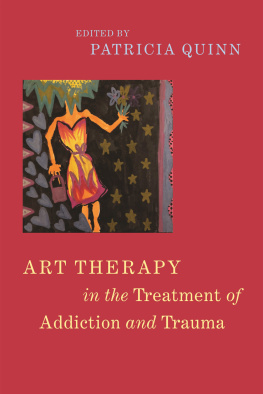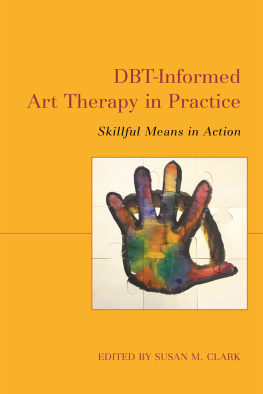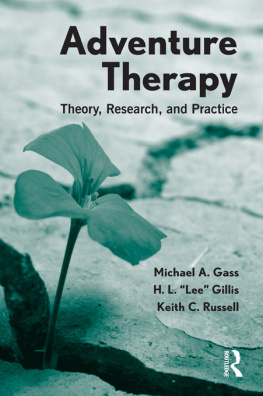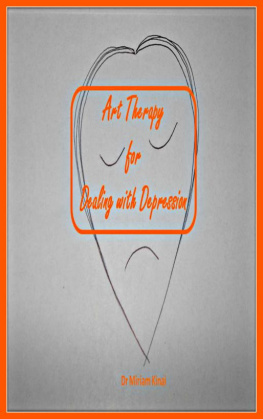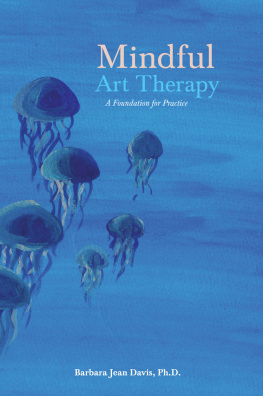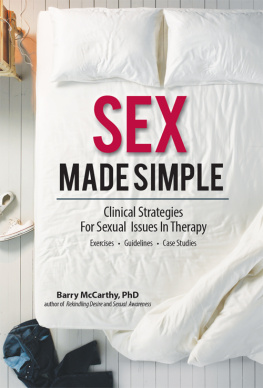Acknowledgments
The first edition of this book resulted from Alvin R. Mahrer, Ph.D. encouraging me to try to improve the field of sex therapy. He asked me about the writers I admired, had learned from, and respected. Could I bring these innovative thinkers and clinicians together, creating a forum for them to provide an alternate vision? With his guidance, the plan for New Directions in Sex Therapy: Innovations and Alternatives began to take shape. Twelve years later, I am still calling my mentor of a lifetime for advice, honest feedback, clarity and transfusions of courage. The brilliant illumination of his model, philosophy of science, psychotherapy research and practice remain the guideposts for my work. He continues to tell me to say what I believe in candid, lucid, undisguised sentences. Al, I am working on it
I would like to thank George P. Zimmar, Ph.D., Publisher at Routledge for pointing out the need for a second edition of New Directions in Sex Therapy. In a time of exploding research, it is all the more critical to ground clinical practice in theory. He and his staff at Routledge/Taylor and Francis, particularly Marta Moldvai, Senior Editorial Assistant and Prudence Taylor Board, Project Editor have been invaluable in their unflagging enthusiasm for New Directions in Sex Therapy and their ideas for strengthening it. Their professionalism and sense of devotion to the contributors own voices have sharpened and clarified our thoughts. Their kindness has made it a pleasure to work together.
I also appreciate the willingness of those colleagues who contributed chapters to this book to entrust their writing to me and to this endeavor. I am especially indebted to long-time collaborators and friends Daniel N. Watter, Ed.D., David S. Ribner, D.S.W. and comrade in advocacy Charles Moser, M.S.W., Ph.D., M.D.
Margaret Lubowiecka and Andy Lubowieckis organizational skills, glowing warmth, caring and friendship made it possible for me to keep my energies focused, again, throughout the duration of this project.
I am especially appreciative of the support and encouragement of my students at the University of Ottawa and at Saint-Paul University, as well as from my fellow BESTCO members (Board of Examiners in Sex Therapy and Counselling in Ontario).
I want to thank all the members of the University of Ottawa Optimal Sexuality Research Team, especially stalwarts and dear friends, Dana Mnard, M.A., Nicolas Paradis, M.Ed. and Meghan Campbell, Psy. D. for puzzling with me as we attempt to discover what makes sex worth wanting and whether any old lover can experience erotic ecstasy.
Thanks also to two extraordinary editors, Michael Barrett, Ph.D., and Thomas Greening, Ph.D., who continue to inspire those fortunate enough to witness their life-long passions for their work.
I owe heartfelt gratitude to the family and friends, old and new, who offered the nurturance that sustained me in the completion of this book. These people include Charles Moser, M.S.W., Ph.D., M.D., and lifelong buddies Mitchell Caplan, Daniel Ziniuk, Jack Buksbaum and Shirah Weinberg-Hecht, Ph.D. No one could ask for a more devoted sister than Irit Sterner, Ph.D. I am enriched for having all of them in my life.
Finally, I thank my beloved. Any old magician can perform sleight of hand, creating illusions that disappear all too quickly. Only an alchemist can perform enduring magic, transforming time itself. I am blessed to share our past and future together. Thank you for continuing to fill my life with awe and delight.
Contributors
Christopher M. Aanstoos earned his Ph.D. in psychology at Duquesne University. He is a Professor of Psychology and member of the graduate faculty at the University of West Georgia. He has lectured widely on four continents, authored over a hundred publications, edited three books, most recently Studies in Humanistic Psychology , and served as a past editor of the journal The Humanistic Psychologist. He is a fellow of the American Psychological Association and has also served as president of its Division of Humanistic Psychology. Address: Department of Psychology, University of West Georgia, Carrollton, GA, 30117. Email: aanstoos@westga.edu.
Bernard Apfelbaum received his Ph.D. in clinical psychology from the University of California, Berkeley, served on the staff of the campus Psychiatric Clinic and as part-time faculty in the Psychology Department Graduate Program, and has been in full-time private practice since then. The approach he is known for, Ego Analysis, informs his chapter as well as his workshops, seminars, and publications in three categories: general therapy issues, sex and sex therapy, and psychoanalysis. For selected papers and bibliography, see www.bapfelbaumphd.com.
Gary R. Brooks, Ph.D., is a Professor in the Doctor of Psychology Program at Baylor University, after having been employed for 28 years as a psychologist with the Central Texas VA. He is a fellow of the American Psychological Association and has been president of APAs Division of Family Psychology and Society for the Psychological Study of Men and Masculinity. He received the 1996 Distinguished Practitioner Award of the APA Division of Men and Masculinity, the 1997 Texas Distinguished Psychologist Award, and the 2010 Outstanding Contribution Award of the APA Division of Men and Masculinity. He has authored or coauthored six books, the latest of which is Beyond the Crisis of Masculinity: A Transtheoretical Model for Male-Friendly Therapy (APA Books).
Alex Carballo-Diguez, Ph.D., is a Professor of Clinical Psychology in the Department of Psychiatry at Columbia University. He is also Associate Director and senior Research Scientist at the HIV Center for Clinical & Behavioral Studies at New York State Psychiatric Institute. His research focuses on primary prevention of HIV transmission: acceptability of and adherence to vaginal and rectal microbicide use among women and men, use of rapid HIV home tests to screen sexual partners, and determinants of sexual risk behavior among men who have sex with men. He is particularly interested in exploring the application of information technology tools to social and behavioral research. His studies are being conducted both in the United States and in Latin America (Argentina).
Maura Devereux, P.A.-C., is a Physician Assistant working with Dr. Charles Moser in San Francisco. She received her physician assistant training with the Primary Care Associate Program at the Stanford School of Medicine and has a Masters in Medical Science from Saint Francis University. She has a Bachelor of Science in Journalism and a Bachelor of Arts in Humanities from the University of Colorado at Boulder. Her practice with Dr. Moser focuses on sexual medicine.
Karen M. Donahey, Ph.D., is a an Associate Professor in the Feinberg School of Medicine at Northwestern University in Chicago, Illinois, and the former director of the Sex and Marital Therapy Program in the Department of Psychiatry and Behavioral Sciences. She works with individuals and couples in private practice.
William B. Elder, M.S., is a Ph.D. candidate (Counseling Psychology Program) at the University of Utah. He received bachelors degrees in psychology and gender studies at the University of Utah, as well as a masters degree in Counseling. He currently works in private practice and is an adjunct faculty member of the Gender Studies Program at the University of Utah. His clinical and research interests are in men and relationships.
Carol Rinkleib Ellison, Ph.D., is a California psychologist in private practice and author of Womens Sexualities: Generations of Women Share Intimate Secrets of Sexual Self-Acceptance. From 1989 to 2005, she was an Assistant Clinical Professor with the Department of Psychiatry at the University of California, San Francisco. A Fellow with the Society for the Scientific Study of Sexuality, Ellison is an esteemed researcher and instructor of courses for nurses and mental health professionals. She is an AASECT-certified Sexuality Educator and Diplomate of Sex Therapy. Her Ph.D. is in Medical Psychology.


